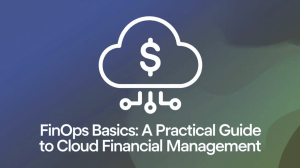Getting Started with FinOps: Practical Strategies for Cloud Cost Management
As organizations continue their shift to cloud-based infrastructure, managing costs effectively has become a crucial priority. FinOps (Financial Operations) is a discipline that brings financial accountability to cloud spending, ensuring that businesses maximize their investments while maintaining agility and performance. This post provides a high level guide to FinOps, its principles, and how organizations can implement cloud financial management strategies to optimize their costs.

Understanding FinOps
What is FinOps?
FinOps is an operational framework that helps businesses control cloud spending by providing visibility, governance, and collaborative decision-making. It allows organizations to:
- Track and analyze cloud costs in real-time.
- Enable cross-functional collaboration between finance, IT, and operations.
- Reduce inefficiencies by optimizing workloads and automating resource management.
- Improve decision-making by aligning cloud investments with business objectives.
Why FinOps Matters
Traditional IT budgeting models struggle to keep pace with the dynamic nature of cloud pricing and usage. FinOps addresses these challenges by:
- Enhancing transparency in cloud expenditure.
- Encouraging proactive cost optimization measures.
- Enabling businesses to scale their cloud operations effectively without overspending.
- Supporting real-time decision-making with financial accountability.
The FinOps Lifecycle
The FinOps lifecycle consists of three iterative stages:
- Inform: Establish visibility into cloud costs, define ownership, and set budgets.
- Optimize: Identify inefficiencies, implement savings strategies, and refine cost allocation models.
- Operate: Continuously monitor, enforce governance policies, and drive cost efficiency improvements.
Each phase requires collaboration across business and technical teams to maximize cloud efficiency while maintaining cost control.
Core FinOps Principles
According to the FinOps Foundation, successful cloud financial management follows these key principles:
- Cross-functional collaboration — Finance, engineering, and business teams must work together.
- Accountability across teams — Cloud usage and cost decisions should be shared responsibilities.
- A dedicated FinOps function — A centralized FinOps team ensures governance and process efficiency.
- Value-driven decision-making — Cloud cost decisions should align with business value and growth.
- Real-time data accessibility — Accurate cost insights empower teams to take timely action.
- Continuous improvement — Cloud financial management is an ongoing process of refinement.
Strategies for Cost Allocation
A well-defined cost allocation strategy is essential for managing cloud spend. Organizations can achieve this through:
- Tagging and resource labeling — Assigning clear cost identifiers to cloud services.
- Chargeback and showback models — Allocating costs to teams based on actual usage.
- Unit economics analysis — Understanding the cost impact per service or product delivered.
- Monitoring resource utilization — Identifying over-provisioned instances and optimizing capacity.
Tools and Technologies for FinOps
Organizations leverage specialized tools to automate and improve FinOps efficiency. Key platforms include:
- IBM Turbonomic — Automates workload placement to optimize costs.
- IBM Cloudability — Tracks cloud spending and provides cost forecasting.
- Finout.io — Offers granular cost breakdowns and analytics.
- CloudHealth by VMware — Manages multi-cloud financial governance.
- AWS Cost Explorer — Provides native AWS cost monitoring capabilities.
- Google Cloud Billing Reports — Supports financial planning for Google Cloud services.
Best Practices for Implementing FinOps
- Build a cross-functional FinOps team — Engage finance, operations, and engineering.
- Define measurable KPIs — Establish cloud efficiency benchmarks.
- Automate cost optimization — Use AI-driven tools to detect anomalies and scale resources efficiently.
- Ensure continuous education — Train teams on FinOps best practices and cloud pricing models.
- Regularly evaluate vendor contracts — Optimize agreements with cloud providers to reduce costs.
- Promote a culture of cost awareness — Encourage teams to take ownership of their cloud usage.
Common Challenges in FinOps Adoption
Despite its benefits, FinOps implementation comes with hurdles such as:
- Lack of cost accountability — Teams may not fully own their cloud expenses.
- Delayed visibility into costs — Without real-time monitoring, budget overruns can occur.
- Complexity in multi-cloud environments — Managing multiple vendors can lead to inefficiencies.
- Underutilized cloud resources — Unused instances contribute to unnecessary expenses.
- Change resistance — Adapting to a FinOps mindset requires cultural transformation.
The Evolving Landscape of FinOps
As cloud environments become more complex, FinOps practices will continue to advance. Future trends include:
- AI-driven cloud cost optimization — Intelligent automation will further streamline financial governance.
- Hybrid and multi-cloud FinOps strategies — Organizations will adopt cost control measures across multiple platforms.
- Sustainable cloud spending — Companies will prioritize energy-efficient cloud operations (Green FinOps).
- Advanced cost anomaly detection — AI-powered analytics will identify spending inefficiencies in real-time.
Summary
Mastering FinOps is essential for modern businesses to maintain financial control over cloud investments. By implementing FinOps principles, utilizing automation tools, and fostering a culture of accountability, organizations can effectively manage cloud costs while driving business innovation. As FinOps evolves, companies that prioritize cloud financial management will gain a strategic advantage in optimizing performance, reducing waste, and ensuring long-term financial sustainability.
For tailored FinOps strategies and consulting services, contact us at info@321gang.com to explore how we can help you achieve cloud cost efficiency and financial governance.
321Gang | 14362 North FLW | Suite 1000 | Scottsdale, AZ 85260 | 877.820.0888 info@321gang.com
